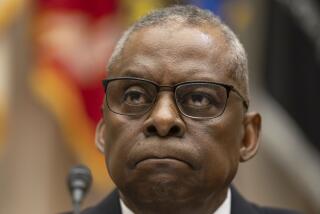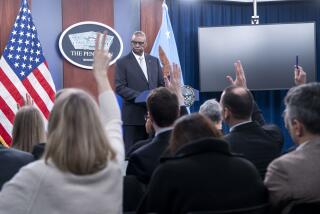New Secret Service chief is grilled by lawmakers, asks for patience
When President Obama named Joseph Clancy as the permanent director of the Secret Service last month, the White House cited the credibility he had earned among the agency’s workforce through a 27-year career there.
Clancy’s insider standing appeared to be a selling point for the first family, whose safety is in his hands, and for the agents and former colleagues he oversees, whose collective reputation had been battered by a string of public lapses in judgment.
That qualification did not, however, appear to satisfy members of Congress on Tuesday.
Turning a routine budget hearing into an early test of Clancy’s leadership, lawmakers renewed questions about whether the Secret Service would be better served by an outsider in charge as Clancy tried to account for yet another embarrassment by agents.
“We’ve got to have some changes,” House Appropriations Committee Chairman Harold Rogers (R-Ky.) told Clancy. “And you have to be the one to make those changes. And I don’t sense at the moment that you have the determination to make that happen.”
Allegations surfaced last week that two senior Secret Service agents, purportedly under the influence of alcohol, disrupted an investigation on the White House grounds March 4.
Clancy said it was unacceptable that it took a tip from an anonymous whistle-blower for him to learn of the incident and said he shared lawmakers’ frustration over it.
But he also sought to cast the episode as less egregious than reports have suggested, saying that agents nudged a security barricade with their government vehicle on purpose to move it out of the way, rather than erratically ran into it. He also said he was waiting to discipline the men to avoid impeding an outside inquiry on what happened.
“This is my first test,” he said. “I’m frustrated that we can’t act until we get all the facts … but I just don’t want to act improperly too soon.”
Over nearly two hours of sometimes intense questioning from members of both parties, Clancy appeared every bit the former agent he was, offering staid, at times tentative, answers. He said it would take time for him to earn the trust of his employees sufficiently to begin overhauling a workplace culture that led to the embarrassments, many of which involved personal misconduct by agents or uniformed officers responsible for the president’s safety.
“As bad as it may be to say this, maybe it’s good that it happened early in my tenure so that we can set a tone as we move forward,” he said.
Clancy found that the patience he is seeking as he works to change the agency’s culture is in short supply on Capitol Hill.
“Mr. Clancy is an exceptionally talented person,” Rep. Jason Chaffetz (R-Utah), chairman of the House Oversight and Government Reform Committee, said after a closed briefing with the director Tuesday evening. Chaffetz announced that his panel was launching its own investigation into the March 4 episode.
“But this is a moment in time where he’s got to send a signal and grab hold of this, let them know there’s a new director and a higher expectation of accountability. And right now, I don’t see it.”
Clancy took the post on an interim basis last fall after a Texas man hopped a fence and evaded other layers of security to make it inside the White House before he was subdued. The breach, and repeated stumbles during a subsequent hearing before lawmakers, cost Clancy’s predecessor her job.
While serving as interim director, Clancy earned early praise for quick action he took, including moving to replace five of his most senior deputies in January.
But in choosing Clancy to run the agency permanently, Obama went against the advice of an independent panel that had contended that only an outsider could deliver lasting change in the culture of the agency.
“The need for service experience is outweighed by what the service needs today: dynamic leadership that can move the service forward into a new era and drive change in the organization,” the report’s eight-page executive summary said. “Only a director from outside the service … will be able to do the honest top-to-bottom reassessment this will require.”
Rep. John Carter, a Texas Republican who headed the Appropriations Committee hearing, said in an interview afterward that he was reserving judgment and hoped Clancy would use all authorities he has to make changes without waiting for his employees to signal he had their backing.
“He doesn’t have to justify himself to them; they have to justify themselves to him,” he said. “He’ll get there, I hope.”
A former White House official who worked closely with the independent panel that recommended the selection of an outsider acknowledged that Clancy didn’t meet the description but said he had made progress.
“A big piece of this is having the president and his family have confidence in the person who’s running that organization,” said the official, who requested anonymity to give a frank assessment of the panel’s thinking. “People internally have reacted pretty well to him and to the changes he’s made already. In fact, one of our biggest concerns of having an insider versus an outsider come in was that it’s very hard to fire your friends. And he did it.”
Obama continued to have full confidence in Clancy’s leadership as he tries to remake the Secret Service, the White House said Tuesday.
“There’s nobody around here, and I don’t think there’s anybody in Director Clancy’s office, who underestimates the size of the task,” Press Secretary Josh Earnest told reporters. “This is very difficult work. And going in and reforming an agency like this will be challenging.”
Rep. Elijah E. Cummings of Maryland, the top Democrat on the House oversight committee, said Clancy “needs a chance to be able to carry out reform.”
“Whenever you see a pattern like that, it’s quite evident that it didn’t happen overnight, and it won’t be resolved overnight,” he said. “The problem, though, is there has to be a sense of urgency because the president’s life may very well depend on that reform.
“The key now is to see how he reacts to this latest situation,” Cummings said.
Twitter: @mikememoli
More to Read
Start your day right
Sign up for Essential California for news, features and recommendations from the L.A. Times and beyond in your inbox six days a week.
You may occasionally receive promotional content from the Los Angeles Times.







